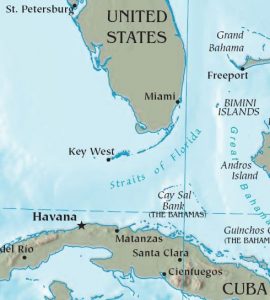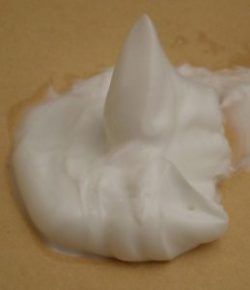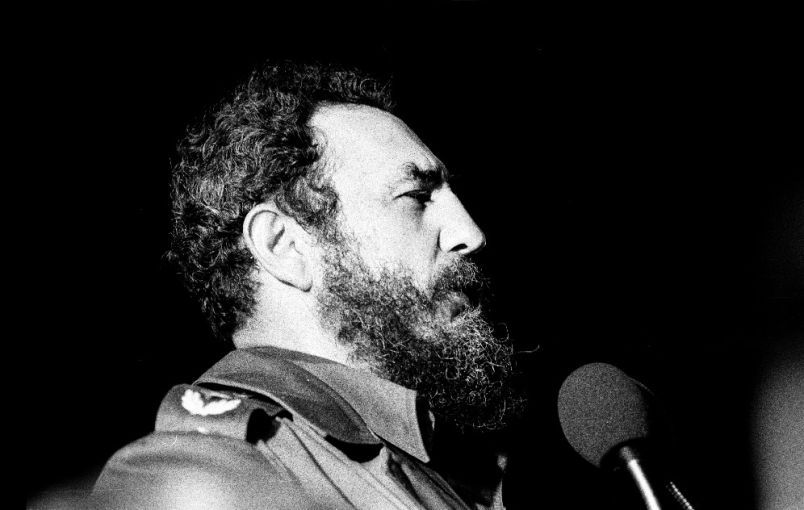Fidel Castro died recently at the ripe old age of 90. It seems that all left-leaning commentators must praise the man who defied the might United States for half a century. As I’m somewhat left of Che Guevara it must follow, then, that I do the same. But Fidel Castro isn’t passing the smell test to me and I thought I’d use the second of this month’s blog posts to explain why.
It’s obvious to all who bothered with reading Cuba’s history that the exceedingly corrupt Fulgencio Batista had to replaced. While Batista was the democratically elected President of Cuba from 1940 to 1944, he came back as a US-backed dictator in 1952. Wikipedia says that:
[R]eceiving financial, military, and logistical support from the United States government, Batista suspended the 1940 Constitution and revoked most political liberties, including the right to strike. He then aligned with the wealthiest landowners who owned the largest sugar plantations, and presided over a stagnating economy that widened the gap between rich and poor Cubans.
The usual capitalist game plan, in other words. In 1959, he was deposed by a re-energised Fidel Castro. See this for a segment from a longer documentary entitled Fidel: The Untold Story.
Castro took over Cuba, nationalised industries, and so on. And, so the story goes, the United States never forgave him. We are told that there were numerous assassination attempts against Castro but that they all failed. Think about that for a second. Then let me introduce you to some other politicians that the United States didn’t like very much and how their failed assassination attempts stacked up.
- Charles de Gaulle, France (natural death). According to sources cited at Fun Trivia (unfortunate name, useful information), there were around thirty failed assassination attempts against de Gaulle, one of them at least US-based. de Gaulle has a number of enemies so let’s say five out of the thirty-one were spearheaded specifically by the United States. (5/31)
- Saddam Hussein, Iraq (assassinated). ABC News says that Israel’s the Mossad tried to kill Saddam three times, failing each time. Saddam was also known to use body doubles and to move from residence to residence to foil assassination attempts. Would all that give credence to the United States also trying their hand at elimination, say, once? What do you think? Sound fair? (1/3)
- Muammar Gadaffi, Libya (assassinated). This one was difficult to find. The most precise number I came across was “several”. What do you think? Twelve sound like too many? Let’s split the dozen between the United States and Europe/NATO, which makes it (6/12).
- Hugo Chavez, Venezuela (cancer). telesur tv mentions five specifically, but let’s double it because they also mention “there were other attempts”. (10)
- Patrice Lumumba, Congo (assassinated). We know of one instance via a virus. Let’s say two, to be on the safe side. (2)
And so it goes. Jose Figueres of Costa Rica (natural death) – 2. Chou En-Lai of China (cancer) – 1. Rafael Trujillo of the Dominican Republic (assassinated) – 1. Michael Manley of Jamaica (cancer) – 1. Osama bin Laden of Saudi Arabia (assassinated) – maybe 6. William Blum has a nice list at his site or, if you prefer, here’s the Wikispooks’ run-down.
Now, how many failed assassination attempts were made on Castro’s life? Ten to tie with Chavez? Thirty(ish) to tie with de Gaulle? Not even close. Would you believe more than six hundred, according to CNN (warning: autoplay video)?
Think about that for a moment. Do you know where Cuba is? It’s an aeroplane joyride away from Florida. Here’s a map.

Yet, despite its proximity, we’re led to believe that the mightiest power in the world, even after the fall of the Soviet Union, could precisely target some Arab amid all the sand dunes and dun-coloured buildings half a world away but couldn’t touch a single man on a technologically backward island within spitting distance of said mighty empire and eliminate him? Doesn’t that sound just a little far-fetched to you?
And for the plots themselves! Good grief, they would have been regarded as too outlandish by James Bond scriptwriters! The Guardian generously outlines some for us, including:
- Painting an explosive mollusc a vivid colour to catch scuba-diving Castro’s attention
- A custom-made diving suit impregnated with a debilitating fungus
- An exploding cigar that also contained botulinum toxin
- Melting poison pills in a cold-cream jar
- A toxic fountain-pen
- A botulin-poisoned chocolate milkshake
- LSD aerosol sprayed while Castro was making a broadcast which would, supposedly, lead to national humiliation as he freaked out on air
- 90kg of high explosives under a podium where he was due to speak
The CIA is renowned for its ability to exterminate those it finds inconvenient. So I’m asking myself, in light of all of the above, did the United States really wish to kill Castro, or was there some kind of competition to see who could come up with the most outlandish way of failing? I can understand thirty, fifty, maybe even ninety failed assassination attempts. (Well no, actually I can’t; I’m trying to be generous here.) But 634?! That failed? I’m sorry, but that’s even more improbable than the neon-coloured clam.
Okay Kaz, you’re thinking. You may have a point. Six hundred failures does sound a tad excessive for the planet’s superpower. But why keep Castro alive? After all, he took over the sugar plantations, causing serious pain to several very influential American businessmen. You think they were willing to throw their lucrative soda companies in the bin just to be patriotic?
Actually, I don’t think the relevant decision-makers cared about the sugar plantations and their owners at all. I think they only cared for themselves and their own future. Let me give you an example.
Before he became associated with right-wing racists, back in 1974, Ballantine Books published Colonel L Fletcher Prouty’s tell-all book, “The Secret Team: The CIA and Its Allies in Control of the World”. Prouty spends a bit of time on the Bay of Pigs incident. It wasn’t a small operation. Its planning and execution covered two presidencies (Eisenhower and Kennedy). It included the United States Air Force bombing all Cuban planes concentrated around the Havana area. (For my American readers, Havana is the capital of Cuba.) It included trained Cuban pilots waiting at an airstrip in Nicaragua to fly additional bombers against Cuban planes should the USAF miss anything. There were 2,000 trained and motivated Cubans waiting to stage a beach landing. The invasion force was backed by one US Navy carrier and five destroyers.
The entire operation was planned and managed by the CIA (yes, even to the extent of ordering US military assets around) so you would expect the head of the CIA to be present at this momentous event, would you not? After all, what could be a bigger feather in Allen Dulles’s cap than the liberation of Cuba, the restitution of capitalism, the bringing to heel of a previously obedient yet now recalcitrant vassal, a punch in the eye to the Soviet Union and the idolatry of America’s financial elite? There’s nothing despotic powers like better than punishing an errant region, and here was The Disobedient Child in spades.
Why, if Allen Dulles had managed to pull it off, it’s not inconceivable that he (whose brother had been Secretary of State) would have had a good chance at a presidential run himself, right? (Many people remember the early 60s as the era of “the brothers”, John and Robert Kennedy, but they forget that there was another double-brother act going on during the preceding Eisenhower years: Director of the CIA, Allen and Secretary of State, older brother John Foster Dulles.)
You can take it as written that Allen Dulles wasn’t a stupid man. None of the heads of the CIA were/are. Not only is he still the longest-serving CIA Director, but he also wrote The Craft of Intelligence, a book Amazon describes as follows:
If the experts could point to any single book as a starting point for understanding the subject of intelligence from the late twentieth century to today, that single book would be Allen W. Dulles’s The Craft of Intelligence. This classic of spycraft is based on Allen Dulles’s incomparable experience as a diplomat, international lawyer, and America’s premier intelligence officer. Dulles was a high-ranking officer of the CIA’s predecessor–the Office of Strategic Services–and was present at the inception of the CIA, where he served eight of his ten years there as director. Here he sums up what he learned about intelligence from nearly a half-century of experience in foreign affairs.
So we’re not talking about a senile Ronald Reagan here, but a consummate lawyer-diplomat-spymaster who would have been party to every important decision made regarding the Bay of Pigs invasion across two administrations. And where was this pinnacle of intelligence when the pigs went down and important decisions needed to be made? According to Prouty:
Dulles had left Washington to go to Puerto Rico to address the convention of the Young Presidents Organization. (p 55) … [I]n sunny Puerto Rico the DCI [Director of Central Intelligence] entered a convention hall to give a speech to a group of young businessmen. This was the kind of elite group he liked. He was at his best among them, and he enlisted their support on behalf of the Agency, which was “saving the world from Communism.” (p 56)
Does that sound at all credible to you? You have planned an operation, guided it past one President, faced opposition from another one eager to see you gone and looking for any misstep, and at the most crucial moment possible, with the resources of the Air Force and Navy at your disposal, operational bases at sea and on land ready, anti-Castro Cubans trained up and slavering for a fight, you not only trip but hurl yourself over a cliff? Does that sound in the least bit credible?
But here’s a thought. Say you want the invasion to fail. Say you want to keep one-joyride-away Cuba as an enemy because your fellow Americans have the geographic knowledge of concussed goldfish and think that ships fall off the map after Jamaica. If you wanted to increase the influence of your own organisation, wouldn’t it be perfect if you could keep a dangerous Commie enemy dangling just off the coast? Think of the tales you could spin! Think of the budget proposals! The intelligence reports! How good it will all look in the annual report! (Not to mention the cigars you could bribe congressmen with.) In fact, wouldn’t Cuba be the perfect exhibit to present to Congress whenever the CIA budget needed a boost? I’m sure even Congress members knew where Cuba was. Roughly.
But then think of who you’d also need to be in on the act. A person like…Fidel Castro, for example.
As long as Castro ranted and railed at the United States, admirably filling the role of anti-capitalist firebrand neighbour, Dulles (and his successors) could make CIA hay while the sun shone. And it wasn’t as if Castro himself was suffering. If the entry on the Bay of Pigs can be believed:
According to Fidel Castro’s former bodyguard, the late Juan Reinaldo Sánchez, Castro lived in great luxury and had a private island in the Bay of Pigs, replete with “mansions, guest houses, a heliport, dolphinarium, turtle lagoon, his luxury yacht Aquarama – a gift from Leonid Brezhnev – and deep-sea fishing speedboat”.
In fact, the greatest danger to Castro was that someone competent would put together a team and take him out before the assassination count got much beyond 50, but there were probably CIA personnel high enough up the chain that were privy to Dulles’s plan and put the kibosh on anything that looked like it might actually work.
As for the Soviet Union, the whole Castro situation worked for them, too. They keep a propaganda tool very close to the United States border and create their own bombast about how they’re sticking it to the imperialist running dogs by continuing to support Castro’s little band of freedom-fighters. So close to the Americans and they can’t do a thing! Ha ha! Take that, Yankee scum!

What’s also interesting is what Castro has to say in each of these assassination attempts. Quoting from The Guardian article again, in the melting poison pills in the cold-cream jar episode:
One former lover was recruited as a hitwoman and given poison pills by the CIA, which she hid in her cold-cream jar. The pills melted and the woman decided that the chances of forcing them into Castro’s mouth while he slept were limited. According to her, Castro guessed her intentions and chivalrously offered her his own pistol so she could finish the job. “I can’t do it, Fidel,” she told him.
Don’t they have…oh what’s the word?…oh yeah…rehearsals for this kind of thing? And cold-cream? What was she, forty? And seriously, “I can’t do it, Fidel”? Did a lone tear trickle down the porcelain skin of her cheek at that point or did that have to wait for an editor’s pen to insert? And what about this:
Asked once if he wore a bullet-proof vest, Castro replied: “I have a moral vest.”
Oh good grief. Spare me. Was Castro such a hack coming out with that himself, or were the lines fed to him by another hack, probably foreign and not so far away based?
In fact, the more I write this essay, the more ludicrous the entire Castro assassination thing sounds. So Castro, anti-US hero? I don’t think so. But gee, it also kept the leftists quiet for a while, didn’t it?
I wouldn’t be at all surprised if, a couple of decades from now, we read some declassified information that says that Fidel was a US collaborator all along, in much the same way as Lech Wa??sa (of plucky Polish Solidarity fame) was recently outed as an intelligence asset (codename “Bolek”) who was taking money from, well, everyone–capitalist, communist and eucharistic (the Vatican). He didn’t care as long as someone was willing to pay him. Glowing write-ups of the Solidarity movement are in many modern high-school history textbooks and, I’m sorry to tell you, but it’s all One Giant Fake. A movement led by an informer happy to sing like a bird and do whatever he was told in exchange for hard cash? Such integrity. Interestingly, like Castro, Wa??sa was also President, but only for ten years (poor thing). I suppose his various paymasters were pretty happy with him because there were no “assassination attempts” needed to take him out. It’d be funny if it weren’t so tragic.
POSTSCRIPT: If you’re taking note of such things, and following the basic themes of this blog, be aware that Wa??sa received the Nobel Peace Prize in 1983, thus joining a long and illustrious list of Peace Prize laureates who did nothing, absolutely nothing, to justify such an honour. But I suppose that just makes it easier to identify such impostors.
* If you liked this article, please consider the Paypal tipjar in the site’s sidebar. I’ll be trying to hit big issues in ways that may not be obvious twice a month, on the first and fifteenth, and every cent helps. Thank you.
